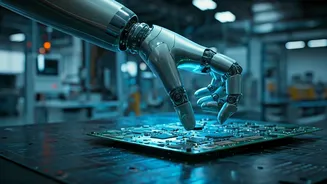Deeptech's Growth Trajectory
The deeptech market in India is on a remarkable growth trajectory, with projections indicating a substantial $30 billion valuation by the year 2030. This
substantial growth reflects the increasing significance and potential of deeptech solutions within the Indian economy. Several critical areas are expected to be pivotal in driving this growth. The convergence of technological innovation and its application in key sectors is creating new opportunities for India's technological advancements. This includes a focus on areas like defense innovation, incorporating cutting-edge technologies for national security, and robotics, which is transforming various industries through automation and advanced systems. These advancements, among others, contribute to the development of new solutions and products, fostering a fertile ground for innovation and expansion.
Defense Innovation's Role
Defense innovation is set to play a significant role in India's deeptech market's growth. The integration of advanced technologies within the defense sector is transforming national security. This involves the use of sophisticated robotics, artificial intelligence, and other cutting-edge developments to improve defense capabilities. Investment and focus in this area will not only contribute to India's self-reliance in defense but also create a platform for the development of innovative products. These advancements contribute to the overall expansion of the deeptech ecosystem. As the nation emphasizes indigenous defense capabilities, deeptech companies will likely see greater investment and collaboration, driving innovation across this field. This focus also has the potential to spin off technologies that can find applications in other sectors, contributing further to economic growth.
Robotics Driving Growth
Robotics is another key element fueling the growth of India’s deeptech market. Robotics has the potential to disrupt and modernize multiple sectors. Industries like manufacturing, healthcare, and logistics are integrating robotics to enhance efficiency, safety, and productivity. Automation reduces human labor and enhances precision, leading to significant improvements in operations. The development of advanced robotics requires expertise in areas such as artificial intelligence, machine learning, and sensor technology, fostering innovation across disciplines. Increased investment in robotics is expected to lead to breakthroughs in areas such as autonomous systems, collaborative robots, and sophisticated industrial applications. This will not only impact the industrial output but also create new employment opportunities as the industry develops.
Startup Ecosystem Boost
The Indian government actively supports the growth of the deeptech sector by fostering innovation. The Department for Promotion of Industry and Internal Trade (DPIIT) has entered into Memoranda of Understanding (MoUs) with over 50 companies. This strategic move aims to create an environment where startups can flourish, and innovation can thrive, fostering a fertile ground for technological advancement. These agreements facilitate collaboration between government agencies, established companies, and emerging startups, fostering a vibrant ecosystem. Supporting startup ecosystems by industry tie-ups is a deliberate effort to strengthen the base of deeptech development, promoting a competitive environment. This collaborative approach enhances the ability of startups to access resources, funding, and mentorship, crucial for their growth. It is expected to encourage innovation and ensure that deeptech solutions are efficiently integrated into various sectors.
Manufacturing Innovation Focus
A significant objective of these government initiatives is to boost manufacturing innovation. Deeptech solutions offer the potential to streamline manufacturing processes, improve production, and create innovative products. By embracing emerging technologies like artificial intelligence, the manufacturing sector can move toward enhanced efficiency, enhanced design capabilities, and sustainable practices. The objective is to foster a culture of technological progress within the manufacturing ecosystem, driving competitive advantage. This approach involves investment in research and development, providing resources and incentives for companies to adopt and implement cutting-edge technologies. The goal is to establish India as a major global hub for manufacturing, where innovation, efficiency, and sustainability are central to industrial operations. This initiative is expected to attract more foreign investment.




















